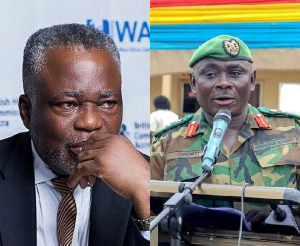Ghana has made significant progress since independence in many areas and has been hailed by many observers across the world when it comes come to political stability, freedom of speech, respect for human right among others. At independence Ghana's population stood around 5.6 million. Today, according to Ghana's statistical service projection, this is around 27.04 million, an increase of 9.7% from 2010 figure of 24.7 million. Institutions of state have also expanded in terms of infrastructure and its human resource requirements. Politically Ghana has also attracted many favourable commentary from political observers and considered as model of democracy in Sub-Sahara Africa from within and without.
Notwithstanding this progress, there are also some level of challenges across all sectors, as there still remain a number of critical challenges that demand urgent solutions to deepen and sustain the progress made but the observer would limit discussions here to how politicization of the civil service is negatively affecting the progress made.
In its role as implementer of the government's executive decisions, supporting and advising ministers, implementing government’s projects and other administrative responsibilities, the civil service plays an important role in Ghanaian life by making sure that the government's policy is carried out. Through government the civil service is to serve the civil society so that ordinary men and women can enjoy the benefits of living in an organised system and environment. Although it serves the government of the day, it is expected to be politically independent by which it ensures the proper and efficient functioning of the whole establishment including stability, security and development.
As they discharge of their duties, civil servants are expected to demonstrate impartiality and be loyal to the government of the day. It is through this that the continuity of state business can be sustained and progress made by its inhabitants. As civil servants, their appointments are on merit, that is on the basis of fair and open competition and are expected to carry out their role with dedication and a commitment to the civil service and its core values of integrity, honesty, objectivity and impartiality. These core values support good governance and ensure the achievement of the highest possible standards in all that the civil service does or expected to do. This in turn helps the civil Service to gain and retain the respect of ministers, parliament, the public and its clientele. It is therefore important to avoid any action or inactions that make the civil service to lose its core values and relevance. But has this been the case in Ghana, especially in recent times?
Politicization of the civil service is a very disturbing and observable phenomena in Ghana today. The political competition between the ruling party and opposition parties appears to be influencing the quality of work and professionalism which are expected of all civil servants. The professionalism with which civil servants in other jurisdictions conduct themselves in delivery essential state business has made those countries to progress in an orderly fashion. The well-drafted code of conduct of Ghana civil service has become a mere paper document as those who flout it are not sanctioned in any way that would serve as deterrent to potential trouble makers. Between 2009 and now enormous pressure has been brought on government from all angles, including the civil service. While some appear legitimate and understandable, others are completely an act of organised group who believe that through sabotage they can make the government unpopular and achieve their political or otherwise ends.
It is on records that some civil servants even provide wrong information to ministers and at the same time stealing sensitive state documents and handing them over to some mischievous individuals in the press in their bid to discredit the government of the day. The situation as observed is that it appears some civil servants prefer serving the self-cantered interests of some political heads or party in whose tenure office they were appointed. As a result, instead of being agents of the state they become agents of those whose appointed them even when they are out of government or the business of the state. In their bid to return to power, some opposition elements then resort to influencing their appointed civil-service agents to engage in acts that they believe would enhance their chances of return but which are detrimental to our progress as a country and wellbeing of Ghanaian people. While ideological differences in our politics, centre-left and centre-right believes, may account for certain behaviours in the Ghanaian civil service, cooperation is of essence in delivery on the national agenda. The scandal that rocked Ghana at 50 and the subsequent failure in prosecuting the individuals involved were as result of some civil servants misleading Attorney General department. If civil servants in the AG's department do not know that those who appeared before a Commission of Enquiry are witnesses and could not be prosecuted, then what are their business there?
Many reports available today on some happenings in Ghana in recent times point to the fact that all is not well with our civil service. Something needed to be done about the rots in the Ghana civil service urgently before we all become immune to the unacceptable conducts in there. Our development and progress as people depends partly on proper functioning of the civil service and all other state institutions. People who show lack of professionalism in executing their responsibility duties assigned them must be held accountable and punish appropriately. Constant review of the code of conduct of civil servants and strict supervision including some form of education is required at the civil service in our current circumstances as a country. Those whose duty it is for the proper functioning of the civil service, must take control of the affairs in there and guide against misleading interests and self-serving individuals who are bent on discrediting the government of the day.
Together we build a better Ghana.
Long Live Ghana
By Alexander Bediako
Opinions of Thursday, 9 April 2015
Columnist: Bediako, Alexander


















